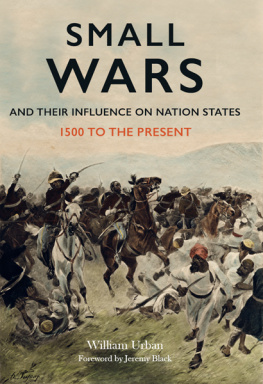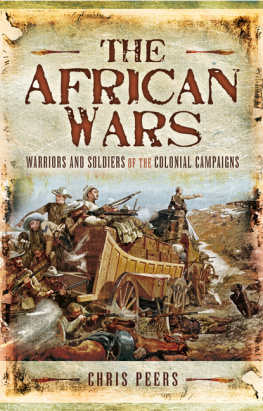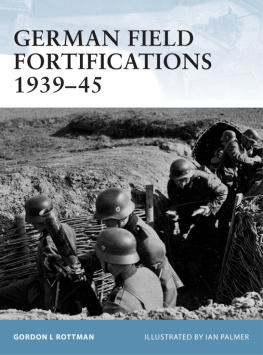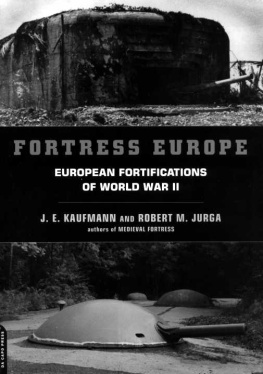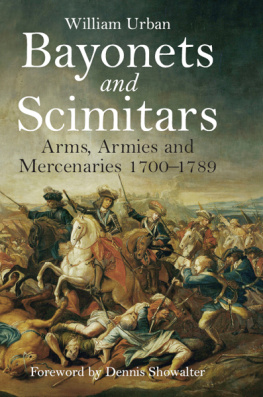
Small Wars and Their Influence on Nation States
1500 to the Present Day
This edition published in 2016 by Frontline Books,
an imprint of Pen & Sword Books Ltd,
47 Church Street, Barnsley, S. Yorkshire, S70 2AS.
Copyright William Urban, 2016
The right of William Urban to be identified as the author of this work has been asserted by him in accordance with the Copyright, Designs and Patents Act 1988.
ISBN: 978-1-47383-792-8
PDF ISBN: 978-1-47384-463-6
EPUB ISBN: 978-1-47384-461-2
PRC ISBN: 978-1-47384-462-9
All rights reserved. No part of this publication may be reproduced, stored in or introduced into a retrieval system, or transmitted, in any form, or by any means (electronic, mechanical, photocopying, recording or otherwise) without the prior written permission of the publisher. Any person who does any unauthorized act in relation to this publication may be liable to criminal prosecution and civil claims for damages.
CIP data records for this title are available from the British Library
Printed and bound by CPI Group (UK) Ltd, Croydon, CR0 4YY
Typeset in 10/13 point Palatino
For more information on our books, please email: ,
write to us at the above address, or visit:
www.frontline-books.com
Contents
To the faculty of the
United States Military Academy at West Point, Summer 1985.
You taught me much that appears here.
Foreword
T his interesting study exemplifies the extent to which history is not only what happened in the past but also how we, today, provide accounts of the past. Our concerns play a key role in this shaping, and William Urban is alive to the particular concerns of the present. A modern age in which jihadists and terrorism play a major part provides the context within which Urban examines others on the periphery and considers the challenges they posed to more settled peoples. As he argues, the success of Western globalisation and technological progress from the sixteenth century led to a marked tendency to treat tribal peoples as peripheral and redundant, and he successfully presents several key instances of this process. Both imperial systems and academic anthropologists categorised these peoples as redundant and bound to fail.
However, this modern approach appears less pertinent today because of the resilience of these peoples. This, then, is a book about centres and peripheries, one that ranges with confidence across time, offering a distinctive, often opinionated, frequently controversial and problematic, but always arresting, account. Much of the book addresses the imperial experiences of Britain and America, but other empires are also discussed. The energy of the writing is accompanied by a range of example and allusion that requires continual effort on the part of the reader. This effort is further to the fore because the approach is thematic rather than chronological, but that helps provide a welcome coherence.
There is also an instructive geographical range. For example, there is a good use of Morocco in order to throw light on the military balance both with Christian Europe and with sub-Saharan Africa. Morocco provides a useful perspective from which to consider military history because it problematizes the usual pattern of Western expansion. Thanks to Portuguese efforts, such an account appears relevant for the fifteenth and early sixteenth centuries, but in 1578, in a dramatic and total defeat, the Portuguese army was destroyed and King Sebastian killed. Portuguese Morocco was rapidly rolled up by the victorious Moroccans, and Western pressure on Morocco did not become a major theme anew until the mid-1840s. This is a good example of how military history frequently looks most instructive if considered in contexts other than that of the leading power. Indeed, works such as that of Urban remind us of the folly of adopting the conventional approach of focusing on the supposed paradigm power.
In such cases, Urban valuably sketches the extent of a deep history that affects the present day. When, in Mali in 2012, Tuaregs seeking independence allied to jihadists advanced south within the state toward the Niger Valley, they did so with great success until French troops helped drive them back into the Sahara Desert. As Urban notes, this did not exactly parallel earlier Muslim penetration into Black Africa, such as that of Morocco from the 1590s, but the comparison is not irrelevant. The extent and impact of deep history are made clear, while the range and variety of the non-West and the peripheral peoples emerges clearly.
Attention subsequently profitably switches to the Americas. Urban explains the limitations of British regulars in the American War of Independence. While not an original topic, this is a useful one, not least because of the extent to which the American Patriots can be seen as peripheral in so far as Western power is concerned. Given the Patriot approach to the Native Americans, the majority of whom were allied to the British, this then becomes a matter of many peripheries, which helps greatly to complicate the situation. From a different angle, rivalry between the peripheral peoples frequently provided their settled rivals with many advantages. Thus, the European Americans benefited from the divisions between Native Americans and the major weaknesses of pan-Nativist movement. Conversely, divisions between the European Americans were significant. This point helps explain the significance of repeated American attempts from 1776 to conquer or intimidate the British in Canada.
In an instructive juxtaposition, the focus then moves to Inner-Asia, and notably to the Chinese advance in the eighteenth century and to its Russian counterpart, both aspects of longstanding processes. The strengths and limitations of the native opponents are ably illustrated. A key limitation again was the divisions among the opponents to both Russia and China. For example, conflict between Kazakhs and Dzunghars helped the Chinese advance into Xinking.
The periphery in literature and military history follow as topics that enable Urban to make a range of points about the wide-ranging impact of frontier warfare. The multiple nature of the frontier emerges clearly, and its consequences for military history. This then is a vigorous work that reflects a fertile mind capable of a broad range of reference. Both the important topic and William Urbans study deserve much attention.
Jeremy Black
April 2015
Introduction
F rontier wars are often associated with terrorism. Irregular warfarethe weak against the stronghas always included tactics that run counter to the moral codes of regular armies, and it often provokes a counterterrorism more terrible than the provocations. Therefore, the subject of terrorism has to be faced immediately and put into context. It is both a strategy and a tactic, and it reflects the values and traditions of people who have no other way to make war.
Any concentration on terrorism alone would inevitably distract from the fact that centres have problems with peripheries that involve the survival of tribal and clan identities opposed to everything the modern secular and industrial world represents. This was true even in industrialising nations in the nineteenth century, where alienation produced by urbanisation led recent arrivals in the cities to search for new individual and group identities, or to seek utopian solutions such as anarchism and communism that promised a simpler and more just society. Often the nation-state simply took the place of older local and family traditions. As long as this seemed to promise prosperity and pride, it was sufficient to satisfy citizens who did not want to emigrate or return to rural poverty. The Great War of 1914-18, however, gave a great blow to hopes that nationality could provide a centre for disordered identities, much less cope with unemployment, crime and poverty. Fascism and Communism quickly arose to take the place of national identity and nationalism. Then, after the failure of those ideological systems, there seemed to be nothing authentic, nothing to be proud of or fight for. For many there was prosperity and pop culture, and, when it came to unpleasant jobs, there were immigrants from the Islamic world, or Africa, or Mexico to do them. But there was a spiritual emptiness, a lack of vision and purpose.
Next page
